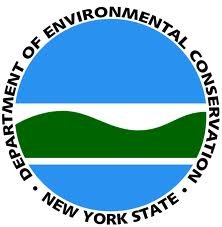New York, NY - April 27, 2015 - With more than 2,400 white-tailed deer tested in the 2014-15 Big Game season in New York State, none tested positive for Chronic Wasting Disease (CWD), the Department of Environmental Conservation (DEC) announced today. However, CWD continues to pose a potential threat to New York's wild white-tailed deer herd.
"Preventing the introduction of CWD into New York is a high priority for DEC to ensure the health of our wild deer herd and to protect the recreational and viewing opportunities deer provide," said Commissioner Joe Martens. "Hunters can play an important role in keeping CWD out of the state and in keeping our deer herd healthy. The most effective way to protect New York's deer herd is to keep CWD infectious material out of the state."
Chronic wasting disease is a highly contagious disease that affects deer, elk, moose and other members of the deer family ("cervids"). CWD is always fatal and there are no vaccines or treatment available. CWD is caused by a misfolded protein called a "prion" that can infect animals through animal-to-animal contact or via contaminated environments. The highest concentration of prions are found in the brain, lymph nodes and spinal tissues of infected animals. Infected animals shed prions in their urine, saliva and feces. Prions can bind to the soil and remain infectious for many years, if not decades.
DEC has been testing wild white-tailed deer for CWD since 2002. In 2005, CWD was found in both captive and wild white-tailed deer in Oneida County. After intensive disease response efforts, no subsequent cases have been detected over the past 10 years. In the 2014-15 surveillance period, DEC tested 2,335 samples from hunter-harvested deer and 86 clinical deer that appeared sick or abnormal. DEC partners with cooperating meat processors and taxidermists to obtain samples each year.
For wildlife diseases like CWD, prevention is the most effective management policy. DEC is developing a comprehensive CWD prevention plan that will be available in 2015.
DEC recommends several measures that will help prevent introduction of infectious prions.
- Do not use deer urine-based lures or cover scents. Prions are shed in a deer's bodily fluids before the deer appears sick. Prions bind to soil and remain infectious to deer that ingest contaminated soil. There is no method of disinfection. Deer urine products sold commercially are collected from captive animals. Urine products cannot be tested for prions. Several states, including Pennsylvania, Ohio and Wisconsin, have detected CWD in captive herds in the last two years.
- Dispose of carcass waste, even from New York deer, into a proper waste stream either by putting butcher scrap in with your household trash or otherwise ensuring it ends up in a licensed landfill. A landowner may dispose of their own deer on their property, but it is illegal in all cases for businesses (butchers and taxidermists) to dispose of waste generated from their business in any way other than a landfill or rendering facility.
- If you hunt deer, elk or moose outside of New York, it is important to make sure you are familiar with New York's CWD regulation regarding the importation of cervid carcasses and meat back into NY before you return home. Certain parts must be removed before entering New York. A full list of prohibited parts can be found on DEC's website. Illegally imported carcasses will be seized and destroyed. It is not legal to bring in whole carcasses or ship intact trophy heads from any CWD-susceptible animal taken from a location with captive deer or captive-bred deer, from any state or Province that has had CWD confirmed in wild or captive cervid herds, or from states west of the Mississippi River. You may only bring back the meat, hide and antlers.
If there is another CWD outbreak in New York, state agencies are prepared. DEC recently developed an Interagency CWD Response Plan with the NYS Dept. of Agriculture and Markets. This response plan will be used if the disease is detected in either captive cervids or wild white-tailed deer or moose.
There is no evidence that CWD can infect humans but DEC urges caution when handling or processing CWD-susceptible animals. Never eat the meat from any wild animal that is sick-acting or sick.










